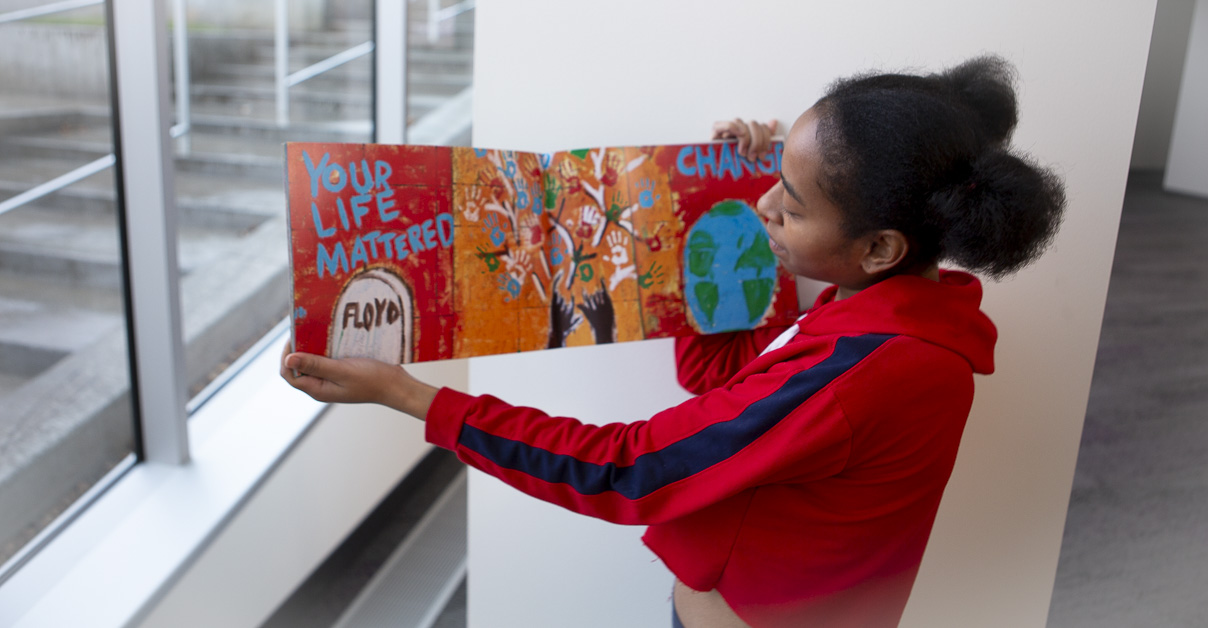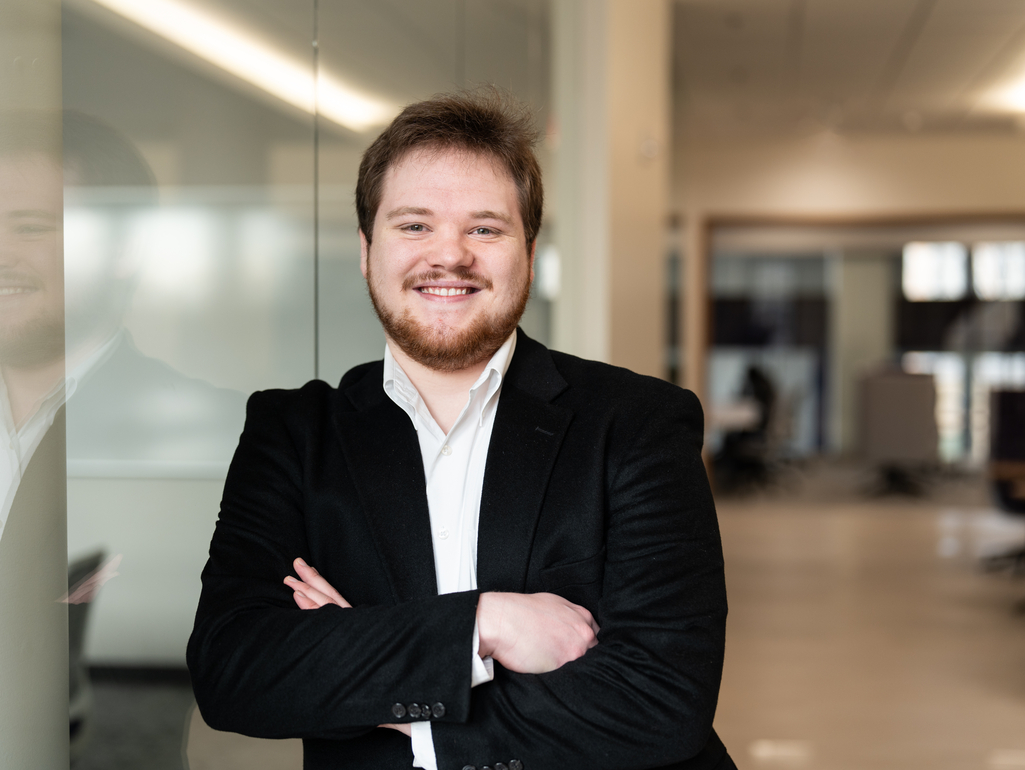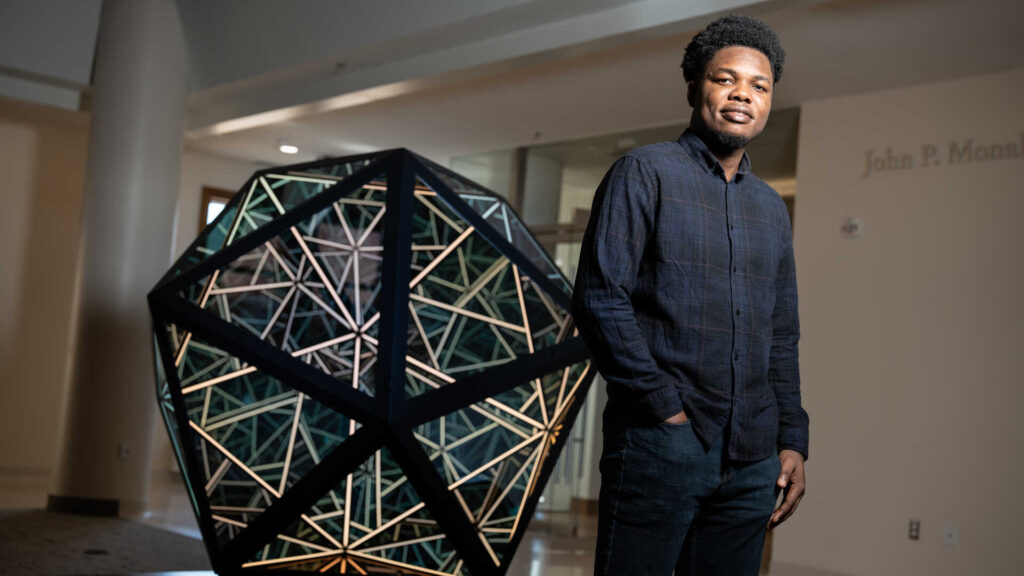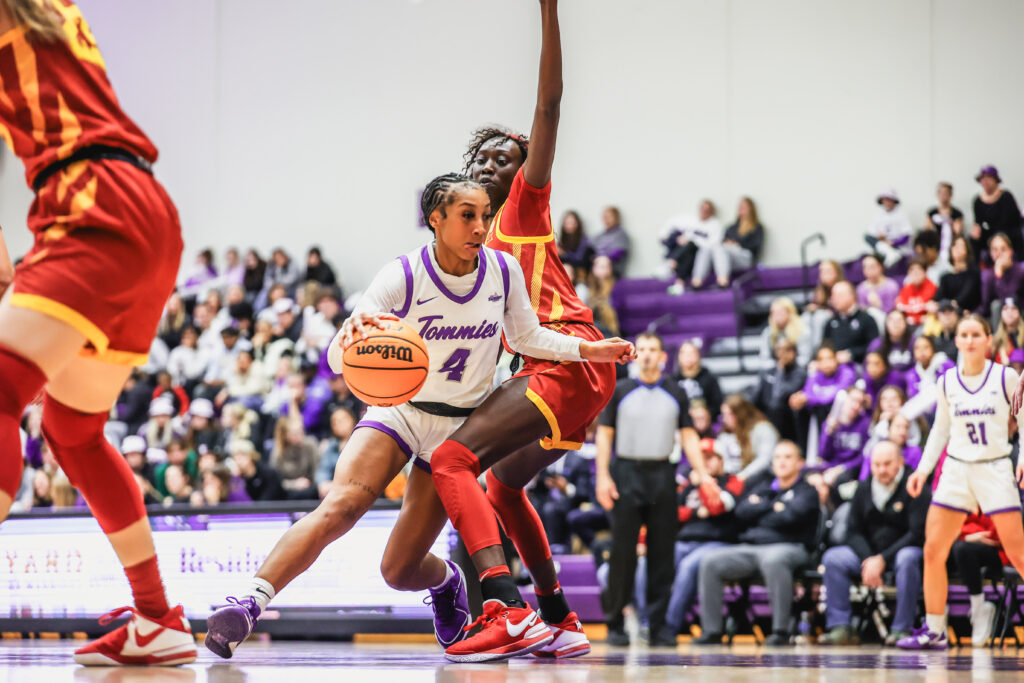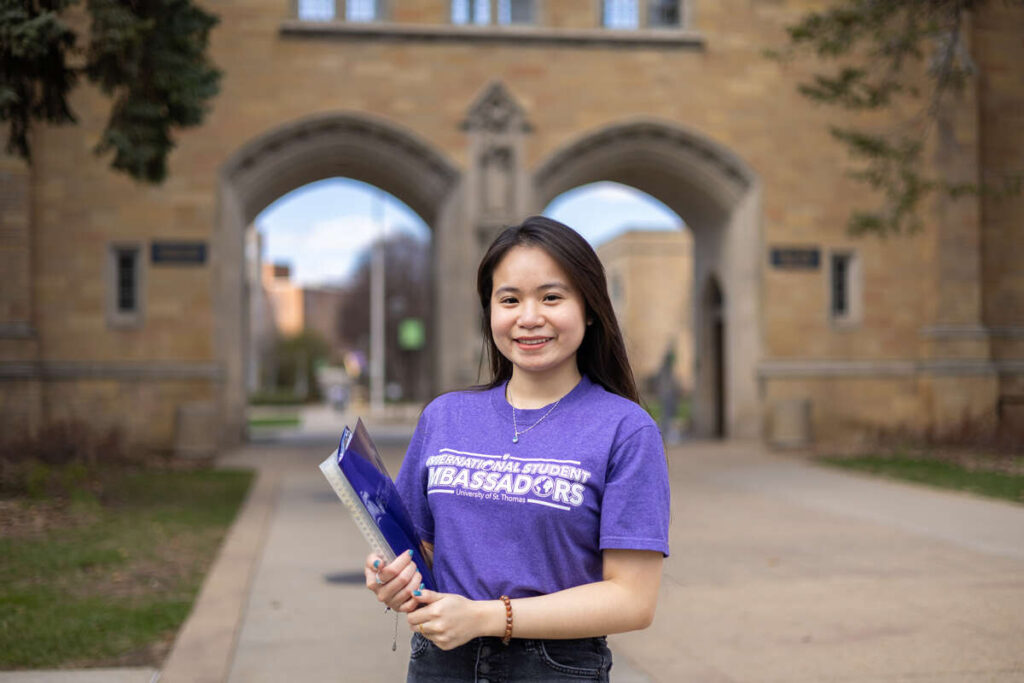Rashaunea Ambers-Winston ’23 grew up in north Minneapolis and began her journey at St. Thomas in fall 2019 when she was admitted to Dougherty Family College (DFC) for an associate degree. With her hard work ethic and daily dedication to her studies, Ambers-Winston became a student who was recognized for her educational success, later receiving a full-tuition scholarship to transition to a bachelor’s degree program at St. Thomas, where she is studying business communication in Opus College of Business.
Tell me about your experience at Dougherty Family College.
I was only having classes in person for a couple months my first year, and then we transitioned to online classes. I had the goal of wanting to get a full ride [for a St. Thomas bachelor's degree], but I wasn't sure if I was really going to make that goal or not. Every day, I worked super hard. There was a lot going on at that time. We were in quarantine and I live in north Minneapolis, where gun violence has been increasing. I lost family members and it was really hard, honestly. My community was on fire. I felt like it was a real challenge for me, but when I earned that scholarship, it really proved I kept going and didn’t give up. I felt like it was a real challenge for me but that story is inspiring to people. I understand how it feels to go through stresses, but to achieve.
I had a lot of good leaders. The staff and the faculty [at Dougherty Family College] encouraged me to strive toward the scholarship. I didn't really believe in myself, but they believed in me which pushed me to believe in myself, too. If it wasn't for those who motivated me, I don't think I would have really tried as hard as I did.
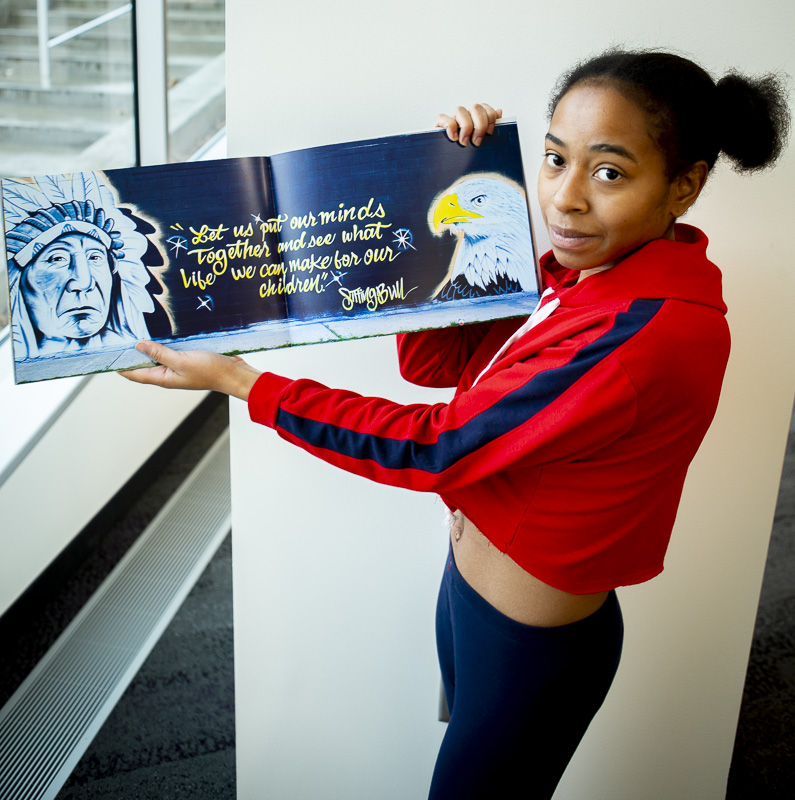
How did you hear about DFC? What prompted you to apply?
I went to Hopkins High School and DFC was mentioned to me by a counselor. I didn't really get into the real information about what it was until I had a class and some DFC representatives came in to give a presentation.
It interested me to try it out. I didn't know what I wanted to major in, and DFC helped me figure out what I wanted to do career wise.
One day, I want to run my own business to help African American youth in north Minneapolis. I guess that’s my dream. Overall, I see myself helping the north Minneapolis community in some way. I also use my poetry to do that as well.
How did you get into poetry?
Poetry was introduced to me while I was in middle school and I started writing it to cope with, and express my deepest emotions. When I was down, I would just write on my phone. It gave me a place to write down my thoughts, the things I couldn't say out loud. At first it wasn't poetry to me – it was just writing.
I learned about poetry, but when I was writing it was like my own form of poetry. It was just me.
I feel like we think you have to know how to be this fantastic writer, but it's really just writing whatever you want to. It's about writing your thoughts and expressing creativity.
There's no limit to writing and that's why I really enjoy doing it. There are no rules or limits. My writing goes off from my experiences and other people's experiences. It's not just about me. It mostly highlights African American injustices, social and racial injustices, and other forms of injustices. I do this for those who don't understand how it feels to be in this position or experience being Black in America. For those who don't know how it feels, it gives them a chance to [understand].
Sometimes I feel like we live our own world and don't see other people's stories. I feel like my poetry is also about uplifting stories and expressing it. When we learn each other on a new level, the judgments and stereotypes we have toward each other fall away.
Do you publish your poetry elsewhere?
Last year during quarantine, I was just like, you know I'm going to be a poet. I was always pretty much a poet, but I never actually told people I was a poet. It was really personal to me.
I developed this website with my poetry on it titled Raw Life Poetry so people can read it. I don't put all of them out there, but some of them are available to read because overall, I want to bring that message to the world about what's going on. I want people to learn how to make a difference. That's what I am passionate about.
Lake Street Speaks brought a big shot to my career as a poet. That's when the world started knowing me as that.

I am working with an artist, Susan B. Shields, whom I met through my mom. When Susan was asking about a poet, Mauri Friestleben, the principal of North High School, told her about me. Susan had two other poets interested in creating this book, but I guess she felt like my poetry brought up a good message. She felt like it was impactful, inspiring and deep.
We connected and this book took about a year to be published. It came out in September.
Tell me about the motivation behind Lake Street Speaks.
The goal of Lake Street Speaks is to raise money to fund four nonprofits in north and south Minneapolis. The money is going to support others. I'm doing it for the community. What's important about this book is that it captures history.
History starts with Minneapolis’ revolution in this book. This art is like a way to preserve it. Those who couldn't be able to see the Minneapolis community in person, could see the art.
The words go lovely with it and expresses those racial and social injustices as well.
How have you been able to promote this book to the Twin Cities community?
I was featured in a podcast that Susan helped me connect with. I'm doing book signings. I created Raw Life Poetry to bring out a message and to share stories. I’m also willing to perform my poetry at events, businesses, schools, etc., to read those poems and to speak.
I also have been featured on KSTP TV, KARE 11 and in the Star Tribune.
I'm just going with the flow and getting opportunities slowly as I go. It's been really fun and exciting. It's all happening so fast, but I'm trying to get out my message.
What has been the reaction from the Twin Cities community regarding the book?
Everyone had been loving it. I feel like people love the artwork. They feel like it's inspiring and I feel like it's been motivating others to want to do something as well.
You get all these artistic vibes and feelings when you look through the art. There are also sad, but meaningful, emotions there too. A lot of people are supporting it and I feel like it’s still getting out there.
What is your favorite part in Lake Street Speaks?
I love all of it. "Flares From the City” is a good poem because it brings this aspect about what happened in Minneapolis during that uprising. It highlights that we were the start of this revolution. We were trying to make this change and it shows how our city was on fire.
I have a “Justice for George Floyd” poem in the book. That was the poem that I wrote when he died. I feel like that one was impactful. When that happened, I just felt so powerless. In writing his story, I felt like I was saying, ‘This is wrong.’ This is a person who died, who didn’t need to die. This has been happening for so long. This was the first time that police brutality towards African Americans was brought into national attention.
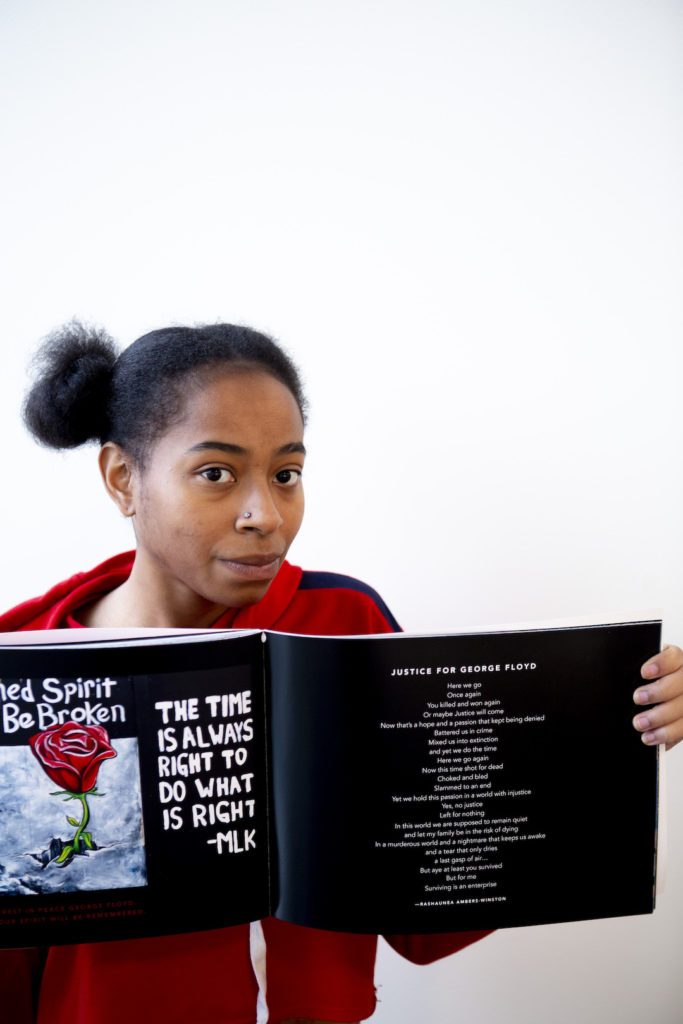
It played on the media so much. It was just really, really deep for me. I also lost my brother to gun violence in 2016. Death has always been around my community. It wasn't new to me, but every time it happens, I have this very sad feeling. Sometimes it feels like there's nothing I can really do. This is the way it is. But when I write, I feel like I'm doing something. I feel like I have power. I feel like I have a voice.
I’m willing to do what it takes to have changed. If I'm just living and not doing anything, I would feel powerless.
I want to encourage others to do something. People feel they can’t do anything and that this is too big of a problem.
I always believe there is something, even if it's something little, that we can do. It could be helping someone who's being treated wrong.
If you could go back and tell your younger self a piece of wisdom, what would it be?
I would tell myself, ‘Don't be so hard on yourself.’ Know that things are all going to come together. Just keep going and keep a positive mindset.
I was hard on myself, so I would want to tell myself that everything will be OK. Just be you. Speak your truth, be passionate, and don't be afraid to be who you want to be.
Who is your biggest influence and why?
My mom. She is the first person to take care of me and she cares for me in the right way. She has been a good mom and she’s taught me what was right versus wrong. She taught me how to be the best I can be. She has a lot of passion herself when it comes to injustice, and her words are very meaningful.
I never realized how much we're alike until I got older. My mom was a big part of encouraging me and helping me.
She was always positive. She was always positive when I wasn’t.
Is there anything else that you want to say?
I want to tell everyone to not be afraid to shine your light. Stay true for you. Stay true to yourself and to others, because being genuine and just expressing love is important.
The people I love are in danger for our skin. This drives my passion of wanting to fight for, and speak about, what's important to me.
Lake Street Speaks by Susan B. Shields and Rashaunea Ambers-Winston can be purchased online through Campus Stores at TommieBooks.
